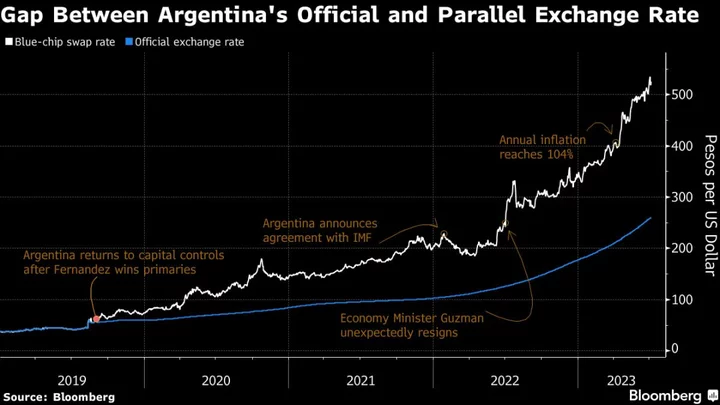Argentine Economy Minister Sergio Massa is both running for president and renegotiating a $44 billion deal with the International Monetary Fund.
That dynamic creates a conundrum for IMF staff as they seek to formulate an economic program and repayment plan without affecting the October vote. If they’re too generous, the aid might help Massa’s prospects by providing a quick jolt to the economy. If they’re too strict, the resulting fallout could crush his chances.
“The IMF would rather not feature in any political campaign ad, neither as a villain nor as a hero,” said Benjamin Gedan, the director of the Wilson Center’s Latin America program in Washington. The fund was accused of attempting to put a finger on the scale of Argentine politics during the last presidential vote in 2019, “so it is very aware of the reputational risks it faces this time around.”
The state of South America’s second-largest economy — about to enter recession amid triple-digit inflation and a quickly depreciating currency — is top of mind for voters, and how it fares over the next few months may determine whether Massa has a path to office.
Read More: Argentina Opposition Infighting Is Hurting Its Election Chances
The minister is likely to represent the ruling Peronist coalition against far-right contender Javier Milei and either centrist Horacio Rodriguez Larreta or conservative Patricia Bullrich from the main opposition bloc. At the moment, polls show the main opposition coalition ahead by single digits versus the ruling party.
Bonds have edged up to about 35 cents on the dollar, the highest since February, on investor bets that any of the top four candidates would push Argentina in a more pro-business direction than the current government.
Fresh aid
Argentine officials and IMF negotiators are meeting in Washington this week to discuss a new staff-level agreement for the $44 billion program that is off track by all yardsticks. The aid package being renegotiated originally began as a record bailout in 2018 after Argentina sought help during a currency run.
An IMF spokesperson didn’t directly respond to questions about any impact on politics. Both sides “continue working very closely” to hammer out an accord, the fund official said in a statement, later adding that Argentina had elected, per IMF rules, to bundle three installments due in July totaling about $2.6 billion into one that would be paid at the end of the month.
Read More: Latin America Leaders Ask Biden to Back Argentina in IMF Talks
An Economy Ministry official said Massa and his team would pursue a strategic vision in the talks, declining further comment.
Government officials are seeking to persuade the IMF to boost a $4 billion disbursement originally scheduled for June to $10 billion instead, partly to help the country offset the effects of its worst drought in a century, which decimated agricultural exports.
Part of the talks will focus on steps Argentina must take in exchange for that bigger disbursement. IMF staff want policies focused on rebuilding depleted cash reserves. They’ve tumbled as officials used the money to prop up the peso by intervening in the parallel currency market and to finance imports.
The second issue is whether the IMF will let the government use the new disbursement to bolster the peso, which has lost half its value against the dollar over the past 12 months and fared even worse in the parallel market Argentines use to skirt currency controls.
Read More: Argentina Expects to Hold Benchmark Rate Through Primary Vote
IMF staff have cautioned against currency intervention, warning it’s an unsustainable strategy.
‘Legacy Issues’
Arturo Porzecanski, a research fellow at American University in Washington, expects the IMF will feel pressure to frontload the disbursement and allow some degree of currency intervention because Massa and other Peronist leaders lambasted the fund four years ago for helping former President Mauricio Macri’s failed reelection bid by frontloading money back then.
“IMF money shouldn’t be used for a losing cause, everyone knows the official exchange rate is overvalued,” Porzecanski said. “But there are these legacy issues.”
Read More: Argentina Economy Shrank More Than Expected Amid Record Drought
Argentina is paying portions of the loan back now while also receiving new disbursements, and the cash-strapped country narrowly avoided default on a $2.7 billion payment to the IMF last week. It came up with the funds by tapping a currency swap line with China and returning special drawing rights to the fund, unusual measures that underscore the shortage of hard currency.
If the IMF doesn’t frontload or allow Massa to intervene, some investors see a difficult trade off where more economic instability before the vote could favor the election bid of Milei, who trails in third place in most polls right now.
“The IMF does have a choice,” said Gustavo Medeiros, head of research at Ashmore Group Plc. “They could say no. The risk is Argentina running out of FX and crumbling the economy before the elections.”
(Updates with details of Argentina repayment to IMF in 8th paragraph)
Author: Maria Elena Vizcaino, Manuela Tobias and Patrick Gillespie

